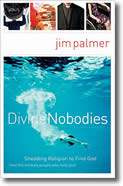Jim
Palmer’s Journey
A Rising Star in the World of Mega
Churches Crashes to Earth and Discovers That’s Where God Has
Been All Along 
Depending
on your religious leanings and geographic location, you may or
may
not have heard the name Jim Palmer. It's almost certain, however,
that you won’t recognize any of the other individuals in Palmer’s
just published spiritual memoir Divine Nobodies.
The
book chronicles the last few years in Palmer’s life, after
the breakup of his marriage and during a spiritual
crisis that left him with nothing but the chance to start
anew. After his wife left, Palmer
resigned from the church he had founded, began working odd jobs
and stared in the face of failure and hurt so deep that
years of “righteous living” ultimately could not erase
the pain.
Jim
Palmer quit trying to earn God’s approval and became a nobody.
By listening to the nobodies that surrounded him every day he learned
that God loved him no matter what he did—or didn’t do.
In
the interview that follows Jim Palmer reflects on his journey from
the top to the bottom, and how it was there, with all the ordinary
folk, that he found the most profound understanding of what it means
to be human.
Below you will find highlights from the explorefaith interview
with Jim Palmer where he talks about his book, his faith and his
journey.
Read
the complete interview.
 You
have written a book titled Divine Nobodies. What makes someone
a Divine Nobody? You
have written a book titled Divine Nobodies. What makes someone
a Divine Nobody?
You
never know whom God will send across your path to awaken you to
the truth that changes everything. The answers to the most important
questions reside inside us, but sometimes we need a little help
discovering them for ourselves. We are all students and teachers.
Some of my teachers who helped unplug my ears and open my eyes to
God were smeared in axle grease or sporting body piercings and tattoos.
Conditioned to expect God in church buildings and worship services,
I never figured on running into him at Waffle House. More…
Isn’t
the goal to become a “somebody”?
One
of the consuming goals of the false self, convinced of its separation
from God and blinded to its true identity, is achieving “somebody”
status. This is the game of distinguishing oneself over others based
on a common human consciousness of “success.” Power,
wealth, accomplishment, position, fame, intellect, special gifts,
and physical beauty are all accepted indicators of being a “somebody.”
…
Jesus
said, “Unless a seed falls to the ground and dies, it remains
only a single seed. But if it dies, it produces many seeds.”
Until we die to our false self, our real self cannot be born into
our human experience and tragically lays dormant within us. …
My
journey backward started by internalizing grace. I discovered God’s
love and acceptance of me was not contingent upon my doing. Up to
that point, despite my scholarly understanding of God’s “unmerited
favor,” I still more or less upheld a checklist of do’s
and don’ts, chasing a “phantom Christian” I imagined
would finally please God and secure his blessing. Until I understood
I literally could not do anything for God to achieve worth and value
in his eyes, I would not stop trying. I could go no further with
God until I abandoned the path of striving for God’s favor.
More…
You
say, “I realized that my Christianity was essentially a glorified
behavior modification program safely rationalized beneath a waving
WWJD? banner.” How would you describe a more authentic Christianity?
I dumbed-down
God’s intentions for me as little more than a self-help and
behavior modification program, with a ticket punched to heaven when
I die. Had God not stepped in through those divine nobodies, I might
well have gone to the grave having missed much of what God wants
to give. The word “relationship” comes to mind when
I think of Christianity— relationship with God, relationship
with one another, relationship with the world. More…
What did you learn about God through Hip Hop?
Turns
out in the end, the main thing God asks of us on the road to wholeness
is the truth. The idea we can “clean up our act” through
our own will power is an illusion, and the only hope of ever being
whole is to receive the life of God. It’s clear from the “hot/cold”
scripture from Revelations that the video [that is] grieving God
is not categorically the hip-hop one, but the one where we come
to church masking our brokenness, out of touch with the truth about
ourselves, while pointing the finger of condemnation at others.
Honestly, I’m messed up in plenty of ways enough myself and
figure I’ve got a ways to go before I feel confident enough
to start tossing stones.
More…
How
did Christianity come to be understood as a religion more concerned
with morality than relationship?
I think
some Christians become especially focused on morality and sin management
out of an inadequate view of the holiness of God and sin. I don’t
believe God is repulsed by our human flaws or views us through eyes
of disgust, as if we need to “clean up our act” to be
acceptable to him. God is perfect and complete within himself in
every way (perfect love, goodness, freedom, beauty, wisdom) and
desires all people to share in his life of perfection. Seeking life
independently of God will always result in falling short of the
perfect peace, fulfillment, freedom and wholeness God wants us to
experience in him. “Sin” is anything less than the perfection
of God, and God’s motive for “hating sin” is love.
In God’s eyes, achieving higher levels of “good”
behavior is not the end game, eliminating every barrier, which hinders
our receiving his divine life is. More…
Do
you think God cares about how we act and what we do?
I believe
we need to recover a spirituality of being, because the matter of
who we are always precedes what we do. We are either acting and
doing out of a false identity and therefore perpetuating a world
of brokenness, or we are acting and doing out of our true self and
giving birth to God’s kingdom. Jesus once said he only did
and spoke what he saw his Father doing and speaking. I believe Christ
wants us to share in this same oneness with God. I believe it is
possible to think with the mind of Christ, see with his eyes, feel
with his emotions, and act with his will. When we are spiritually
whole, our words and actions in this world are the expressions of
God himself among us. More…
You
had a very painful childhood. How have you been able to move past
that trauma?
For
many years I was a grown up man with this little kid inside convinced
he was stupid, worthless, and ugly. I can still vividly remember
the first time I experienced God looking directly into the eyes
of that little boy and telling him he was loved. What seems to be
making me whole is knowing that God loves and accepts me just the
same whether I’m living in the freedom he provides or I’m
too depressed to get out of bed. My prayer for any person who has
suffered from an abusive past of any kind, is that they will see
themselves through God eyes and rest in his love. More…
What
compels the people in your book to act with such love and compassion
towards others?
The
people who selflessly and sacrificially love others unconditionally
and indiscriminately are simply being who they really are in Christ.
Thinking about some of the divine nobodies I allude to in the book,
there wasn’t anything particularly unique about them that
explains how extraordinary they were in their love. Most of them
were simply the guy next-door types or the gal ringing your groceries
up at the register. Jesus said, “Blessed are the poor in spirit,
for theirs is the kingdom of heaven.” These people were simply
willing to humbly open their hearts to receive what God wants to
give. And what God gives can’t be fully contained within us
and naturally spills out on others. Maybe the world needs a few
more spills before its eyes are open to the source. More…
Read
the complete interview.
Copyright ©2006
explorefaith.org

To purchase a copy of DIVINE
NOBODIES, visit amazon.com. This link is provided as a service
to explorefaith visitors and registered
users. To learn more about Jim Palmer, visit divinenobodies.com.
|




